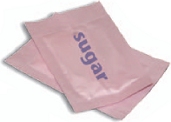 Can tooth decay affect infants?
Can tooth decay affect infants?
Yes! Tooth decay in infants and young children most often occurs in the upper front teeth, but also may affect other teeth. Parents may not realize that a baby’s teeth can decay soon after they first appear. The decay may even enter the underlying bone structure, which can hurt development of the permanent teeth. This problem is frequently referred to as baby bottle tooth decay. This decay is caused by long-term exposure of a child’s teeth to liquids containing sugars. When a child consumes a sugary liquid, acid attacks the teeth and gums and causes decay.
 How can children prevent damage to their teeth?
How can children prevent damage to their teeth?
At school, children should rinse their mouth with water after meals, leaving their teeth free of sugar and acid. At home, encourage children to drink tap or fountain water. Use a straw when drinking soda to keep sugar away from teeth. If you purchase bottled water, be sure that it is fluoridated. Remember, bottled juices are not a good alternative due to the high sugar content. Regular dental checkups, combined with brushing with fluoride toothpaste also will help protect children’s teeth.
 How can I help my child prevent tooth decay?
How can I help my child prevent tooth decay?
Brushing teeth after meals, regular flossing and fluoride treatments are the best ways to prevent tooth decay. Children should also be supervised as they brush. A good rule of thumb is when children can dress themselves and tie their own shoes, then they are ready to brush unsupervised. Children should be supervised in proper flossing techniques until the age of 10. If you have any concerns about your child’s dental health or want some tips on preventing tooth decay, ask your dentist.
When should my child first see a dentist?
The ideal time is six months after your child’s first (primary) teeth erupt. This time frame is a perfect opportunity for the dentist to carefully examine the development of your child’s mouth. Because dental problems often start early, the sooner the visit the better. To safeguard against problems such as baby bottle tooth decay, teething irritations, gum disease, and prolonged thumb-sucking, your dentist can provide or recommend special preventive care.